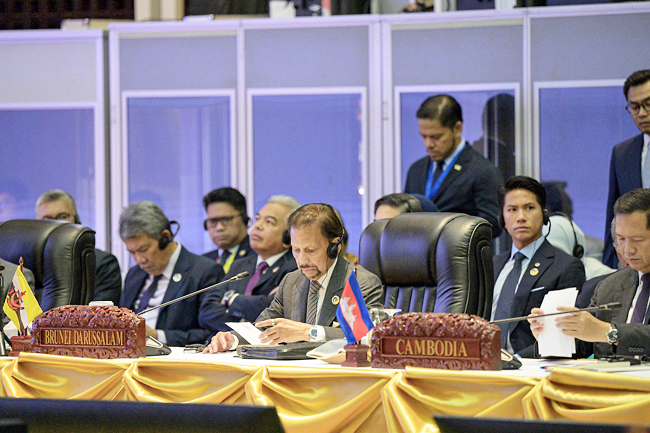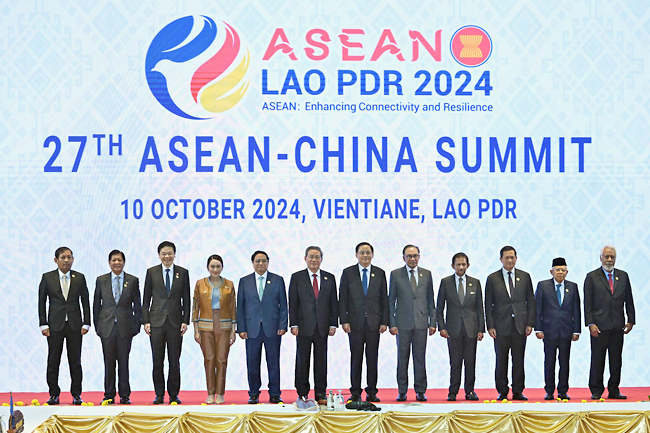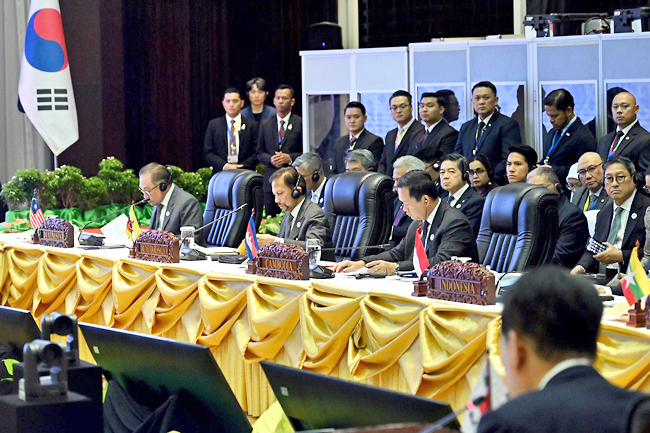His Majesty Sultan Haji Hassanal Bolkiah Mu’izzaddin Waddaulah ibni Al-Marhum Sultan Haji Omar ‘Ali Saifuddien Sa’adul Khairi Waddien, Sultan and Yang Di-Pertuan of Brunei Darussalam yesterday attended the 27th ASEAN-China Summit; 25th ASEAN-Republic of Korea (ROK) Summit to commemorate the 35th anniversary of dialogue relations, the 27th ASEAN-Japan Summit and the 27th ASEAN Plus Three Summit, at the National Convention Centre in Vientiane, Laos.
Accompanying His Majesty was His Royal Highness Prince ‘Abdul Mateen.
27TH ASEAN-CHINA SUMMIT
The summit discussed ASEAN-China cooperation and its future direction, in which His Majesty delivered a titah, acknowledging the progress made in enhancing cooperation under the comprehensive strategic partnership and appreciating the activities organised for the ASEAN-China Year of People-to-People Exchanges, which have contributed to deeper socio-cultural ties.
Touching on ASEAN’s growth prospects in the digital economy, the monarch stated that the prospects are projected to reach almost USD1 trillion in value by 2030.
His Majesty underscored the importance of enhancing digital capabilities and creating opportunities for the people, particularly youth, who are increasingly embracing entrepreneurship and innovation. In this regard, the ASEAN-China Free Trade Area upgrade was welcomed, especially in e-commerce and e-services, as a step to realise the full potential of a region-wide digital economy.




In sustaining economic growth, His Majesty further underlined the importance of addressing interconnected challenges such as food and energy security, as well as climate change. The United Nations (UN) estimates that developing countries may need to spend up to USD300 billion by 2030 to mitigate the effects of climate change.
The monarch also encouraged increasing efforts to improve coordination and develop strategies to ensure future prosperity. Therefore, His Majesty expressed appreciation for China’s interest to support the ASEAN Centre for Climate Change, and welcomed further strengthening of cooperation on climate change, including through the ASEAN-China Technical Cooperation Agreement.
During the summit, leaders were pleased with the strengthening of economic ties through the upgrading of the ASEAN-China Free Trade Area, which is hoped to promote economic integration and furthermore facilitate trade and investment flows.
In addition, leaders also proposed to enhance cooperation in future growth areas such as green economy and smart agriculture.
25TH ASEAN-ROK SUMMIT
During the 25th ASEAN-ROK Summit to commemorate the 35th anniversary of dialogue relations, His Majesty in a titah stated that the ASEAN-ROK partnership has seen immense growth over the last three decades, thus the monarch valued the South Korea’s contributions to promoting regional peace and prosperity, adding that the establishment of a meaningful, substantive, and mutually-beneficial ASEAN–ROK Comprehensive Strategic Partnership is very timely.
In addition, His Majesty said, technological advancements have fundamentally changed how we interact and conduct business in recent years.
According to the Asian Development Bank, Internet usage, especially in Southeast Asia, has reached at least 70 per cent, enabling companies of all sizes to reach global markets through e-commerce.
His Majesty expressed the view that South Korea is uniquely positioned to contribute to ASEAN’s digital transformation including infrastructure development, such as digital payment gateways and capacity-building programmes.
In this regard, the monarch looked forward to working with South Korea through the Korea-ASEAN Digital Innovation Flagship Project to support the region’s digital connectivity.
As new technologies also present security challenges such as cyberattacks, online theft and data breaches, His Majesty also emphasised the need to collaborate closely on cybersecurity initiatives.
At the end of the titah, the monarch expressed appreciation for South Korea’s support for ASEAN through the ASEAN Cyber Shield Project to ensure a safe and secure cyberspace for our people.
At the summit, the leaders noted that South Korea plays a crucial role in advancing digital transformation within ASEAN, particularly in artificial intelligence.
Leaders also called for the expedition of energy transition as well as balanced development to ensure a sustainable future for all.
27TH ASEAN-JAPAN SUMMIT
While attending the 27th ASEAN-Japan Summit, His Majesty in his titah highlighted that Japan, as a longstanding partner of ASEAN, has significantly contributed to the region’s peace and prosperity, which paved the way for establishing the comprehensive strategic partnership. ASEAN and Japan’s solid relationship is deeply rooted in strong people-to-people connections, built on mutual trust and respect, cultivated by years of heart-to-heart cooperation. To this end, the monarch expressed appreciation for the various initiatives that bring people closer together through scholarships, cultural exchanges and networking activities, and for Japan’s contribution to the ASEAN Junior Fellowship programme, which provides another platform to build and nurture friendships.
Touching on the energy sector, His Majesty highlighted that Southeast Asia’s rising energy demand is fuelled by its growing population, which has increased by three per cent annually in recent decades, according to the International Energy Agency. The increased energy consumption has also contributed to worsening climate change impacts, resulting in infrastructure damage and the loss of lives. Thus, the monarch underscored the urgent need for immediate action to safeguard the well-being of the people of ASEAN and Japan.
His Majesty emphasised the need for ASEAN and Japan to work together to accelerate energy transition, including through the Cleaner Energy Future Initiative for ASEAN, and to explore alternative sources to meet the region’s rising energy demand.
The monarch also encouraged closer cooperation between relevant centres of ASEAN and Japan, such as the Asia Zero Emission Centre and the ASEAN Centre for Climate Change to develop and recommend policies and actions in mitigating and addressing climate change.
It was also brought up that Brunei Darussalam will be organising a regional workshop on climate change with ERIA to be held next year.
Discussions between the leaders underscored the importance of Japan’s decarbonisation efforts in ASEAN moving to a low carbon community and welcomed the establishment of the ASEAN Power Grid.
With complementarities between the ASEAN Outlook on Indo-Pacific (AOIP) and Japan’s Free and Open Indo-Pacific, cooperation should be intensified in the four priority areas of the AOIP, namely: maritime, economy, connectivity and the Sustainable Development Goals.
27TH ASEAN PLUS THREE SUMMIT
At the 27th ASEAN Plus Three Summit, His Majesty in a titah acknowledged that the ASEAN Plus Three (APT) continues to be an essential driving force for furthering East Asian Cooperation. From the Asian Financial Crisis to SARS and the COVID-19 pandemic, the APT have come together to successfully weather these challenges that have disrupted regional development.
Furthermore, the plus three countries played a pivotal role in collective efforts, whereas their continued support and contributions have been instrumental in effectively addressing the challenges that confront our region including the establishment of the Chiang Mai Initiative Multilateralisation (CMIM), APT Emergency Rice Reserve (APTERR) and the APT Macroeconomic Research Office (AMRO).
The monarch therefore emphasised that these mechanisms must be strengthened and new ones must also be established to be ready and effectively respond to future emergencies and disasters, towards ensuring that the APT remains a solid platform for regional development and resilience.
In concluding the titah, His Majesty appreciated the support for APTERR Table-top Exercise to be held in 2025, which aims to evaluate APTERR’s response and effectiveness, as well as enhance coordination among its members.
The leaders’ discussions during the summit were centred on enhancing regional supply chains to sustain economic recovery in response to the COVID-19 pandemic, along with the need to bolster ASEAN and the plus three countries’ collective resilience through the strengthening of food security cooperation as well as capacity building for their human capitals.




